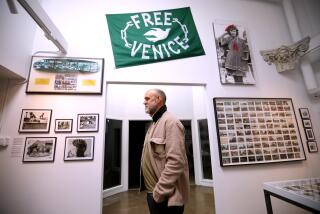Philomene Long, 67; well-known Venice poet
Philomene Long, a poet, teacher and filmmaker who was known as the poet laureate of Venice, died of heart failure Aug. 21 at her home near the Venice boardwalk, according to her twin sister, Pegarty Long. She was 67.
“Philomene was passionately committed to poetry,” said Fred Dewey, director of Beyond Baroque, the Venice literary arts center. “She understood it down to her old Irish roots.”
According to Dewey, Long wrote in the tradition of the Beat poets of the 1950s and ‘60s but added phrases that suggest Zen koans and liturgical chants, drawing from her personal interests and experience. Long, who spent about five years as a Catholic nun in her 20s, was a Zen practitioner.
“Many different streams fed her work,” Dewey said.
She wrote several volumes of poetry, including “The Queen of Bohemia” and “The Ghosts of Venice West,” and also wrote “American Zen Bones, Maezumi Roshi Stories,” a prose work about the founder of the Zen Center of Los Angeles. As a film director, Long is best known for “The Beats: An Existential Comedy,” with poets Allen Ginsberg and Lawrence Ferlinghetti making appearances. She also directed “The California Missions,” narrated by Martin Sheen.
“She was not only a poet but a teacher and mentor who carried forth the Beat poetry tradition,” said S.A. Griffin, who included Long in “The Outlaw Bible of American Poetry,” an anthology he co-edited in 1999.
During her 16 years on the faculty of the writers’ program at UCLA’s extension school, Long taught courses on the creative process and on poetry for non-poets, among others.
“Philomene brought a deeply loving, positive quality to her teaching,” said Linda Venis, director of the program. “Student evaluations were extremely high.”
Early in her literary career in the 1960s, Long befriended members of the Beat Generation poets of Southern California, part of the larger movement led by poets Jack Kerouac and Ginsberg.
The group’s bohemian lifestyle was described in “Venice West, the Beat Generation in Southern California” (1991) by historian John Arthur Maynard, who referred to Long as “mercurial” with a memorable sense of style. She was “a regular feature of the Ocean Front in her tennis shoes, black thrift-shop dresses, long, straight hair, alarm-clock pendant and heavy silver cross,” Maynard wrote.
Her adopted city inspired many of Long’s poems. One of them is written on a “poet’s wall” near the boardwalk. It reads:
Venice,
Holy Ground
Stained with the blood of poets
City which lies
Beneath the breasts of birds
Guarded by cats
Behind every corner
The Muse, Angel of Surprise
Poems out of pavement cracks.
The daughter of a naval officer, Long was born Aug. 17, 1940, in New York City. She moved with her family to San Diego as a teenager.
She graduated from the Academy of Our Lady of Peace high school in San Diego and Mount St. Mary’s College in Los Angeles. She also earned a master of fine arts degree at UCLA.
After her early plan to become a nun, she discovered that she wanted to be a poet and moved to Venice. In recent years Long upheld the community’s reputation as a haven for artists, often opening her small apartment near the beach to gatherings of writers, musicians and artists.
“Philomene was deeply committed to the bohemian lifestyle, a life outside the normal groupings of society,” Dewey said.
Long was married twice, according to her sister. In addition to her sister, who is also a filmmaker, Long’s survivors include her children, Maureen Luna-Long and Patrick Moore, and grandchildren, Aiden and Tara Sandman-Long.
A funeral service is planned for 10 a.m. today at St. Monica Catholic Church, 725 California Ave., Santa Monica.
More to Read
Sign up for our Book Club newsletter
Get the latest news, events and more from the Los Angeles Times Book Club, and help us get L.A. reading and talking.
You may occasionally receive promotional content from the Los Angeles Times.








